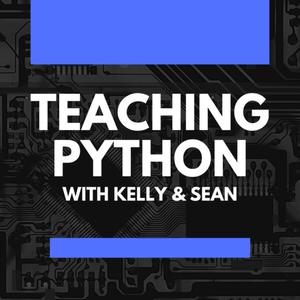
Teaching Python
Sean Tibor and Kelly Paredes
We're two middle school teachers learning and teaching Python
- 56 minutes 11 secondsEpisode 138: Innovative Coding Education with Pamela Fox
In episode 138 of Teaching Python, hosts Sean Tibor and Kelly Schuster-Paredes welcome Pamela Fox, a Principal Developer Advocate at Microsoft, to discuss the dynamic world of teaching, coding, and creating. Pamela shares her experiences working with Python in the cloud, emphasizing the various applications from serverless functions to web application backends using frameworks like Flask and Django. This episode provides a comprehensive look at how cloud-based environments like GitHub CodeSpaces and CoLab make programming more accessible and reduce the friction often associated with setting up development environments.
Pamela dives into her approach to teaching and the unique challenges posed by different educational formats. Drawing from her work at institutions like UC Berkeley and her development of AP Computer Science Principles content for Khan Academy, she highlights the importance of making learning engaging and personalized. Pamela shares insights into the design of interactive and project-based curricula, touching on how tools like Parsons problems can scaffold learning effectively and make complex concepts like recursion more approachable.
The conversation also explores the significance of visualizations in learning programming, as exemplified by Pamela's recursion visualizer tool. The episode concludes with reflections on the breadth of topics covered in AP CSP and the value of exposing students to a wide array of programming experiences. Listeners gain a deeper understanding of the balance between teaching fundamental concepts and encouraging creative expression through code, along with practical tips for educators at all levels.
Special Guest: Pamela Fox.
Links:
- GitHub - pamelafox/recursive-visualizations: An online tool to visualize recursive JS functions step-by-step as a tree. — A way to visualize the call graph of recursive functions. Uses Pyodide to run rcviz.py and then a WASM PyDot/GraphViz port to build an SVG graph. Finally, some JavaScript adds a slider for stepping through the calls.
- GitHub - pamelafox/faded-parsons-static: A way to run Python Faded Parsons problems entirely in the browser. — This website allows you to run Faded Parsons Problems in the browser. It uses Pyodide for executing Python doctests and localStorage for storing user progress.
30 September 2024, 4:00 am - 48 minutes 24 secondsEpisode 137: Lifelong Learning with Kelsey Hightower
In this insightful episode of Teaching Python, hosts Sean Tibor and Kelly Schuster-Paredes engage in a dynamic conversation with the eminent Kelsey Hightower. The episode delves into Hightower's journey from self-taught programmer to distinguished engineer at Google, touching on the significance of lifelong learning and the non-traditional paths that many successful technologists follow. Hightower's anecdotes are not only inspiring but also provide valuable lessons on perseverance and the importance of staying curious.
The episode tackles key themes around the entrepreneurial mindset, advising both students and educators on how to take calculated risks and break away from conventional norms. Hightower shares his unique insights on how thinking like an entrepreneur can lead to personal and professional growth, and how these principles can be applied even in structured educational environments. His stories about facing and overcoming challenges offer a blueprint for anyone looking to innovate within their current roles.
For educators, Hightower's discussion emphasizes the need to look beyond the standard curriculum and foster an environment where students feel empowered to explore and experiment. The episode is rich with ideas on how to cultivate a nurturing yet challenging atmosphere that encourages students to think independently and embrace failure as a stepping stone to success. Whether you are a teacher, student, or tech enthusiast, this episode provides a wealth of wisdom on nurturing potential and achieving excellence.
Special Guest: Kelsey Hightower.
Links:
- Kubernetes: Up and Running: Dive into the Future of Infrastructure: Burns, Brendan, Beda, Joe, Hightower, Kelsey, Evenson, Lachlan: 9781098110208: Amazon.com: Books — In just five years, Kubernetes has radically changed the way developers and ops personnel build, deploy, and maintain applications in the cloud. With this book's updated third edition, you'll learn how this popular container orchestrator can help your company achieve new levels of velocity, agility, reliability, and efficiency--whether you're new to distributed systems or have been deploying cloud native apps for some time. Brendan Burns, Joe Beda, Kelsey Hightower, and Lachlan Evenson--who have worked on Kubernetes at Google and beyond--explain how this system fits into the life cycle of a distributed application. Software developers, engineers, and architects will learn ways to use tools and APIs to automate scalable distributed systems for online services, machine learning applications, or even a cluster of Raspberry Pi computers.
- Great Software & Storytelling Is Emotional | Kelsey Hightower (Legendary Developer) | CRAFTED. - YouTube — Kelsey Hightower is a legend. He’s a Kubernetes pioneer and recently retired (at 42!) from Google where he was a distinguished engineer. He still regularly gives live software demos in front of tens of thousands of people, improvising them like it’s jazz. He’s a master storyteller and a master craftsman.
- Kelsey Hightower (@kelseyhightower) / X
- kelseyhightower (Kelsey Hightower) · GitHub
18 August 2024, 4:00 am - 54 minutes 59 secondsEpisode 136: Learning Python with Dr. Chuck
Summary
This episode features a conversation with Dr. Chuck Severance about making programming accessible to everyone, the importance of practical applications in learning, and the potential of remote internships in programming education.
Description
In this episode of Teaching Python, hosts Kelly Schuster-Paredes and Sean Tibor chat with Dr. Chuck Severance, widely known as Dr. Chuck, about his innovative approaches to make Python and programming accessible to everyone. They discuss Dr. Chuck's methods for engaging learners of all ages, the critical role of practical application in education, and how creating connections can help students retain complex concepts.
The conversation also delves into the potential for scalable, remote internships and how empowering students with programming skills at a younger age can have far-reaching effects on their future careers. Dr. Chuck shares his experiences, strategies, and vision for the future of programming education, making this episode a must-listen for educators and learners alike.
Sections
- Introduction
- Wins of the Week
- Guest Introduction
- The Making of a Viral Python Course
- Importance of Practical Applications
- Empowering the Future with Python
- Closing Remarks
Special Guest: Dr. Charles Severance aka "Dr. Chuck".
Links:
- PY4E - Python for Everybody — This web site is building a set of free materials, lectures, book and assignments to help students learn how to program in Python. You can take this course and receive a certificate at: Coursera: Python for Everybody Specialization edX: Python for Everybody FreeCodeCamp Free certificates for University of Michigan students and staff CodeKidz
- PY4E - Python for Everybody — The goal of this book is to provide an Informatics-oriented introduction to programming. The primary difference between a computer science approach and the Informatics approach taken in this book is a greater focus on using Python to solve data analysis problems common in the world of Informatics.
11 August 2024, 4:00 pm - 51 minutes 31 secondsEpisode 135: Python for Lawyers
In this episode of Teaching Python, hosts Sean Tibor and Kelly Schuster-Paredes dive deep into the innovative intersection of law and coding with special guests Morgan Gray and Wes Oliver from Duquesne University's School of Law. This fascinating conversation explores how Python programming is being integrated into the law curriculum to enhance the analytical and information processing skills of law students. The episode kicks off with introductions and personal anecdotes, setting the stage for a thought-provoking discussion about the future of legal education.
Morgan and Wes share their unique journey of incorporating Python into their legal courses, detailing their beginning stages and the progression they've seen in their students. They discuss the challenges and rewards of teaching coding to future lawyers and the significant benefits it provides to their legal studies and careers. Through real-life examples and success stories, listeners gain insight into how Python is not only a tool for software development but also a powerful aid in legal problem-solving and decision-making.
The episode wraps up with a look at the broader implications and future opportunities for law graduates who possess coding skills. Sean and Kelly highlight the feedback from employers and the growing demand for tech-savvy lawyers in the industry. Whether you're a law student, educator, or tech enthusiast, this episode offers a compelling look at how the integration of coding into non-traditional fields can open new avenues for innovation and efficiency.
Special Guests: Morgan Gray and Wes Oliver.
Links:
- Thomas R. Kline School of Law of Duquesne University — We educate lawyers to preserve the highest ideals of our profession and to promote equal justice and democratic discourse through leadership, service, and civic engagement. As a student at Duquesne Kline, you will receive a well-rounded legal education full of opportunities to practically apply your coursework—through our clinics, our appellate programs, and innovative offerings, like our Leadership Fellows Program and JD/ MBA program.
- Professors present groundbreaking “Coding for Lawyers” course at Python Education Summit — Thomas R. Kline School of Law of Duquesne University Professor Wesley Oliver and Adjunct Professor Morgan Gray, L’19, recently presented at the Python Education Summit (PyCon) in Pittsburgh.
8 July 2024, 4:00 am - 1 hour 7 minutesEpisode 134: Interview with Jay Miller
In this episode, we have a candid conversation with Jay Miller, the founder of Black Python Devs. Jay shares his journey into the tech world, highlighting the inspiration behind starting Black Python Devs and the essential role it plays in extending the reach of the Python community into the black ecosystem. We discuss how his organization fosters safe, equitable, and accessible environments for Black developers, breaking down barriers and creating pathways for new talent to enter and thrive in the industry.
Our discussion touches on the critical need for diversity and inclusion within tech communities and companies. Jay elaborates on practical strategies to make tech events and workplaces more welcoming for historically excluded groups. From the importance of having a strong code of conduct to providing logistical support like childcare and travel reimbursements, Jay emphasizes how small actions can make a significant impact in creating a culture where everyone feels they belong.
We also dive into the often overlooked challenges that Black tech professionals face, such as negotiating salaries and finding mentors who look like them. Jay offers invaluable insights on why visibility and representation matter, sharing personal anecdotes and practical advice for both aspiring developers and established leaders. Whether you're an educator, a tech professional, or someone interested in creating more inclusive communities, this episode is packed with thought-provoking discussions and actionable takeaways.
Special Guest: Jay Miller.
Links:
- Black Python Devs | About Us — Black Python Devs was created by its founder Jay Miller after seeing a trend of the same handful of Black developers speaking at major conferences, taking leadership positions, and dealing with the same challenges towards burnout.
- Aiven - Your Trusted Data & AI Platform — Aiven is a versatile platform empowering you with AI-driven workload optimization and control over your data. Deploy widely adopted technologies across multiple clouds with just a few clicks to stream, store, and serve your data.
- FastAPI — FastAPI is a modern, fast (high-performance), web framework for building APIs with Python based on standard Python type hints.
- Talk: Nina Zakharenko - Goodbye Print, Hello Debugger! - YouTube — Still debugging your code with print? Learn how to level up your ability to troubleshoot complex code situations by using the power of a fully-featured debugger in this talk aimed at all levels of programming ability. Debuggers allow you to examine your program state, watch as the values of important variables change, and even modify the content of variables on the fly. Once I gave up using print to debug, my productivity as a programmer increased, and yours can too!
- Django Girls - start your journey with programming — Django Girls is a non-profit organization and a community that empowers and helps women to organize free, one-day programming workshops by providing tools, resources and support. We are a volunteer run organization with hundreds of people contributing to bring more amazing women into the world of technology. We are making technology more approachable by creating resources designed with empathy.
- PyCon US 2024 - PyCon US 2024 — After two years of PyCon US in Salt Lake City, we are so excited to welcome our community to our new host city of Pittsburgh, Pennsylvania! Mark your calendars and be sure to read the About PyCon US page for all the details. We can’t wait to see you all at the David L. Lawrence Convention Center!
1 July 2024, 12:00 am - 32 minutes 34 secondsEpisode 133: Live from PyCon 2024
In this special episode of Teaching Python, hosts Sean Tibor and Kelly Schuster-Paredes broadcast live from PyCon US 2024, exploring the significant role educators play within the Python community. The hosts discuss the importance of engaging more educators at PyCon and other Python conferences, addressing the challenges and barriers educators face such as financial constraints, time commitments, and overcoming imposter syndrome. With contributions from a live audience, the episode delves into personal experiences of attendees, highlighting the immense value these conferences provide for professional development and networking. Discussion points include the benefits of the Education Summit, opportunities for cross-disciplinary learning, and the sense of community that PyCon fosters. The hosts also propose solutions to increase educator participation, including the potential for travel grants and better informational outreach. Together, they emphasize the collective goal of enriching the teaching and learning experience within the Python community by encouraging wider educator involvement.
12 June 2024, 4:00 am - 38 minutes 51 secondsEpisode 132: Getting Non-Coding Teachers into CS
Join us in an enlightening conversation with Dora Palfi, co-founder of Imagi, and Chelsea Clagg, an instructional technology coach from Frederick County, Virginia, who share their experiences with making coding education more inclusive and accessible. Learn about the challenges and triumphs of implementing coding programs in schools, and how tools like the Imagi Charm are designed to make coding tangible and relatable for students. Discover how non-coder teachers are overcoming their hesitations and embracing coding to inspire a new generation of learners.
This episode sheds light on the importance of coding in today’s education and the crucial role of creativity and cross-curricular connections in engaging students. Hear firsthand accounts of teachers and educators who, despite having no coding background, have successfully integrated coding into their curriculum, making it a valuable tool for enhancing cognitive skills and preparing students for the future. Explore the transformative power of coding education and how it’s shaping the educators of tomorrow.
Whether you are a seasoned coding professional or a curious newcomer to the field of education technology, this episode offers valuable insights into making coding accessible and fun for everyone. Through real-world examples and engaging discussions, discover how coding is not just about learning a new language but about building a foundation for critical thinking, problem-solving, and creativity in the digital age.
Special Guests: Chelsea Clagg and Dora Palfi.
28 May 2024, 4:00 am - 41 minutes 28 secondsEpisode 131: Lightning Talks
In the latest episode of Teaching Python, “Episode 131: Embracing the Spark with Lightning Talks,” hosts Sean Tibor and Kelly Schuster-Paredes delve into how the concise and dynamic format of Lightning Talks can revolutionize teaching and learning. Beyond the light-hearted introduction that sets the tone for a spirited exchange, the episode offers a deep dive into the essence of Lightning Talks. Through engaging discussions, Sean and Kelly share personal insights and practical examples of incorporating this format into classroom settings, from coding classes to improving public speaking skills among students.
Listeners will gain valuable strategies for employing Lightning Talks as a pedagogical tool, with emphasis on their simplicity, the encouragement of critical thinking, and the promotion of a more inclusive and engaging learning environment. The episode is rich with anecdotes and experiences, highlighting how these brief, impromptu presentations can ease the anxiety associated with public speaking, inspire creativity, and facilitate a deeper connection with subject matter. Furthermore, the conversation also touches on the adaptability of Lightning Talks across different educational contexts, offering listeners a comprehensive view on integrating this format into their teaching repertoire to ignite enthusiasm and foster a vibrant learning culture.
15 May 2024, 2:00 am - 1 hour 5 minutesEpisode 130: Coding is Dead?
In this episode, we grapple with the provocative question: Is coding still relevant in a rapidly evolving world dominated by generative AI? Our engaging panel discussion features insights from Sean Tibor and Kelly Schuster-Paredes, hosts and creators of the renowned Teaching Python podcast, along with a lineup of distinguished guests. Each voice adds a unique perspective on how AI is reshaping the landscape of coding and education.
Joining the discussion, we have Michael Kennedy from the Talk Python To Me podcast, known for his expertise in Python and its applications across various domains. Next, Blake Rayfield, a professor at Northern Arizona University, shares his perspective on the role of AI in higher education and research. The episode is rounded out with Brian Okken, host of the Python Test podcast, who provides a critical look at how AI is influencing software testing and development practices.
Together, this panel navigates the complex terrain of AI's role in coding and education, sparking insightful debates and offering viewpoints that reflect the diverse spectrum of thought in the tech community.
Special Guests: Blake Rayfield, Brian Okken, and Michael Kennedy.
28 April 2024, 10:00 pm - 26 minutes 26 secondsEpisode 129: Quickbite: Live Coding and Codealongs
Join Sean and Kelly in this QuickBites episode as they explore the technique of live coding presentations in education. They highlight the cognitive benefits, such as active learning and enhanced understanding, as well as the engagement and communication fostered through this teaching method. The conversation covers the importance of error normalization, metacognition, critical thinking, and student participation, emphasizing the role live coding plays in empowering students to solve problems and build confidence in their coding abilities.
29 March 2024, 4:00 am - 41 minutes 46 secondsEpisode 128: From Blocks to Code with PickCode
In episode 128 of Teaching Python, hosts Sean Tibor and Kelly Schuster-Paredes dive into the world of coding education, focusing on the journey from block to text coding. They are joined by Charlie Meyer, co-founder and CEO of Pick Code, to discuss strategies and tools that make learning to code an engaging and enjoyable experience for students. The conversation also covers personal anecdotes from the hosts and guest, emphasizing the balance between fun and learning in coding education.
Today's Topics:
- Making Coding Engaging
- Personal Coding Stories and Teachings
- Tools and Strategies for Coding Education
Special Guest: Charlie Meyer.
Links:
- Pickcode | The coding platform for education — Pickcode's online editor is the easiest way to teach and learn programming
24 March 2024, 2:00 pm - More Episodes? Get the App
Your feedback is valuable to us. Should you encounter any bugs, glitches, lack of functionality or other problems, please email us on [email protected] or join Moon.FM Telegram Group where you can talk directly to the dev team who are happy to answer any queries.
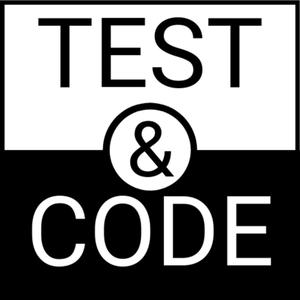 Test and Code
Test and Code
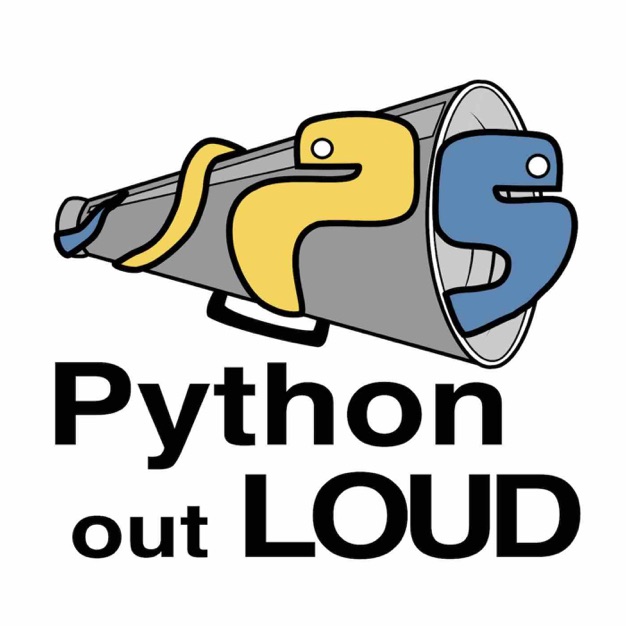 Python Out Loud
Python Out Loud
 The Local Maximum
The Local Maximum
 Django Chat
Django Chat
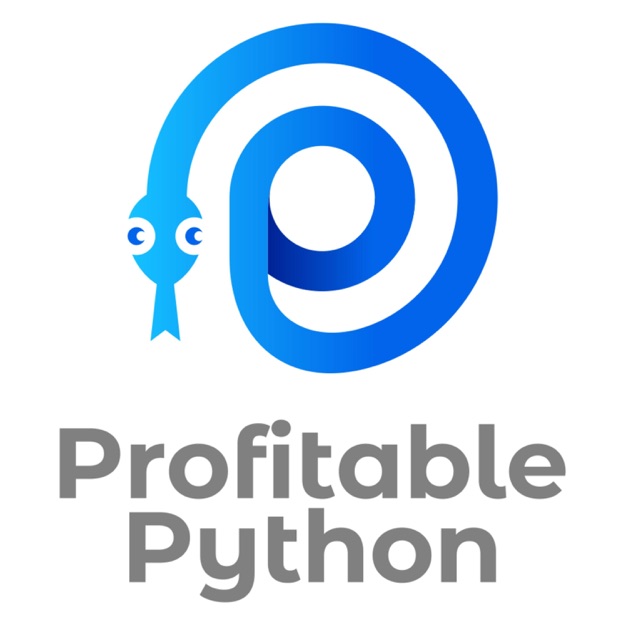 Profitable Python
Profitable Python
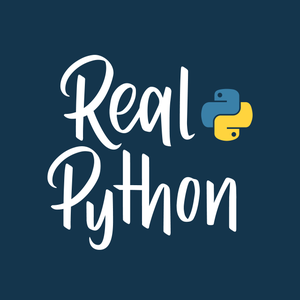 The Real Python Podcast
The Real Python Podcast